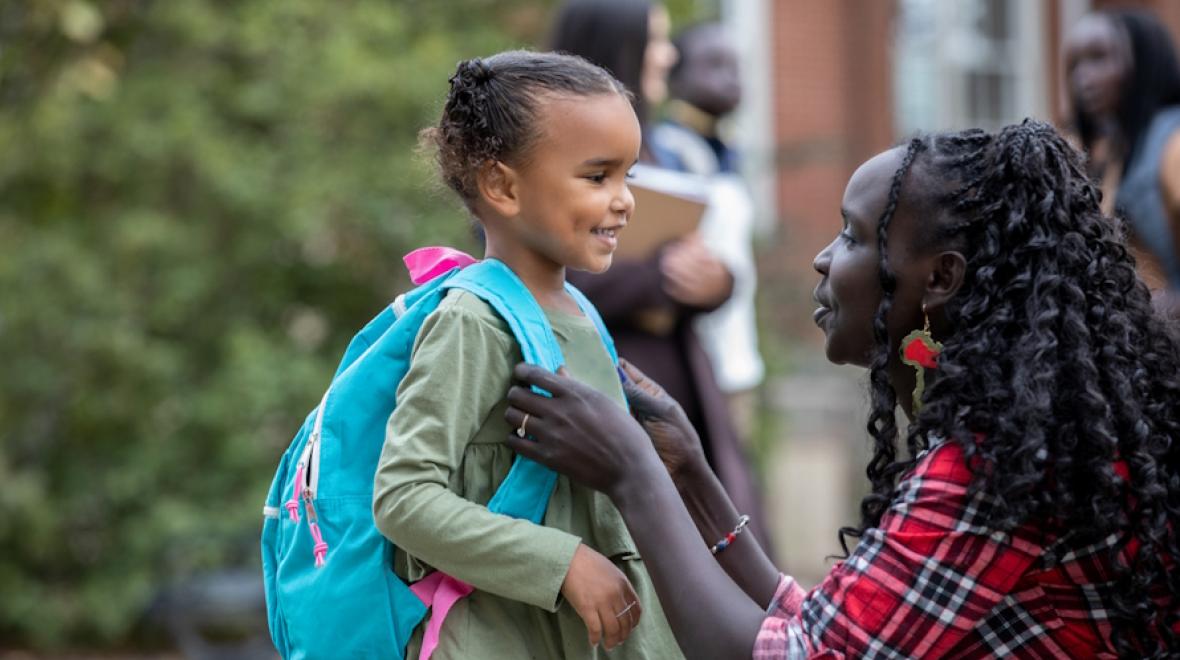
When I was pregnant with my oldest daughter, it was the one time in my life that I felt somewhat prepared. From birth and baby classes to parenting books, I absorbed all of this new information to help me get ready to be a parent. Everyone from friends and family to strangers at the grocery store would offer advice on how to best prepare for our new arrival. As it turned out, we needed every bit of that information. Bringing home a new baby is hard!
The newborn stage is not the only time parenting is challenging. As parents, we need all the help we can get at every stage of the experience. My youngest child entered kindergarten this year, and I was reminded just how much can change as kids transition out of the preschool years and head into elementary school. I didn't receive nearly as much advice for this stage as I did for the baby phase. Looking back at my oldest's first day of kindergarten, there's so much I'd have done differently.
In the spirit of sharing collective knowledge and experience, we asked you, our readers, to share your advice about what you wish you'd known before your kids headed into their first day of kindergarten, and those important and change-filled elementary years. We've collected your parent wisdom here and encourage everyone to read and pass it on.
1. Get the lay of the land before the first day of kindergarten.
“Go visit the school and check out the playground. See where the buses will pull up and talk about where they will enter the building, etc. Try to meet friends who will be in the same grade at the same school. If there’s a summer camp being held at the school, sign up so that your kid can get comfortable in the classrooms and on campus.”
“Allow your child to make as many choices as possible; which new backpack, first-day outfit, legal name or nickname, lunch/snack options, etc.”
“Attend all the open houses. Meet the teacher and map out as much as possible exactly how the day will go. We started the tradition of a 'first-day' cake as well, complete with a song. Something to look forward to, and [it] gave this mama something to do besides worry.”
“If your child is entering kindergarten in Seattle, have them attend Jump Start at their school — they will learn where the bathrooms are and get comfortable with the teachers, the classroom and other kids, which enables them to walk into school more confidently on their first day.”
“Teach children how to introduce themselves with a smile. This is the first step to making friends.”
“The lunch period is really short. Parents should pack things that their kids can eat quickly and can open themselves. I peel, or at least start, mandarin oranges and cut open bananas and packaged things. Do what you can to help the kids get as much food as possible. Remind kiddos to eat protein first.”
2. How to handle the first day of kindergarten.
“Children, in general, are resilient. I know that the first day was much more difficult for me than them. Try to keep your emotions in check when dropping them off — this lets your child know that you believe in them and that it will be okay.”
“Don’t linger long — it makes it tough for everyone, including the teachers.”
“If you can take the day off, try to schedule a meet-up with other new kindergarten parent friends after drop-off. It allows you to commiserate over the anxiety of sending them to school for the first time, and also ensures that you don't hover in the classroom!”
“I put a small family pic in my kiddo’s pencil box on the first day. On the back, I wrote a note of love and encouragement. I also put a little note in her lunch box along with her favorite treat.”
3. Get involved.
“Be involved in school functions, set a consistent volunteer schedule and be in the classroom. If every parent could volunteer just one day for a few hours every other month, the teacher would have extra hands and eyes every day.”
“Get as involved as your schedule allows. My kids have loved seeing me at the school regularly and have learned about how much background work goes into all the fun events they enjoy.”
“Connect with the PTSA! They aren't scary, they are YOU. They can help answer questions and make you feel more like part of the school community.”
“Partner early with your student's teachers and other school staff. Volunteer if you are able; you will see a lot and make important connections. Trust the teachers — they love kids and are there to help your student grow and develop.”
4. Stress less.
“Your kid will likely be just fine in kindergarten. Even if he’s used to eating eight times a day, he will adjust. He doesn’t follow directions or sit still? He will learn. He doesn’t know all his letters? He will get there. They learn so much from their peers. Kindergarten is scary, but most do okay and they learn how to do circle time and independent play, how to eat lunch quickly and how to make the most of recess.”
“Science fair projects aren't the end of the world. It just feels like it.”
“Take the educational goalposts of the school with a grain of salt. They were so worried about my son reading in kindergarten. I pushed him and in the end, he got there at the same age that I did (end of third) and is now an amazing reader. With my daughter, I chilled out. LAP (Learning Assistance Program) is great but no reason to freak out.”
“School is important but so is being a kid and so is being a family. Some kids need mental health days, too. Just like adults do. It's okay to play hooky. There is no right way to do anything. There is just the best way for you.”
“The budget will change, you can't choose the teacher, that program you like may be cut, teachers will apply the school's philosophies in their own ways, and so on. So, make your choice and relax.”
“Stay calm and be patient. The first few months take a lot of adjustment for everyone, and kids feed on your energy — positive or negative.”
5. Parents have power — and choices.
“It's okay to hold your child back. You have to tell the school, because they will push them through regardless.”
“If you suspect your child has a learning disability, don't wait for the school to bring it up; most teachers know very little about dyslexia and related learning disabilities, and the 'balanced literacy' curriculum that most schools currently use does not work for one out of three of kids.”
“Consider dual-language kindergarten. It’s not for everyone, but [it's good to] know that it’s an option.”
“There are so many other options beyond traditional schooling, and kids don't legally have to be formally educated until the age of 8 in Washington. As moms, we are pressured so much about school and we are made to feel like they must be put in school at such a young age! This simply isn't true, and it isn't necessarily in the best interest of the kids — but nobody tells us this!”
“If you're considering multiple schools and agonizing over which school is right for your child, take a deep breath and bear in mind that you can always change course. Yes, it seems like a monumental decision and you want to get it right, but I know parents who started private and then went public. I know parents who've done the opposite. Schools change, kids change and not every school or learning situation is right for every child, so don't worry about what your friends, neighbors or co-workers are doing with their kids. Do what's best for your kids and your family.”
“If your kid is happy and learning, great. If not, you can explore other options. If you are struggling with the teacher or school, try a sincere approach first. Ask, 'How can I help?' rather than being accusatory and saying 'Why are/aren't you doing X?'”
Editor’s note: This article was originally published in a few years ago and was most recently updated in 2023.











